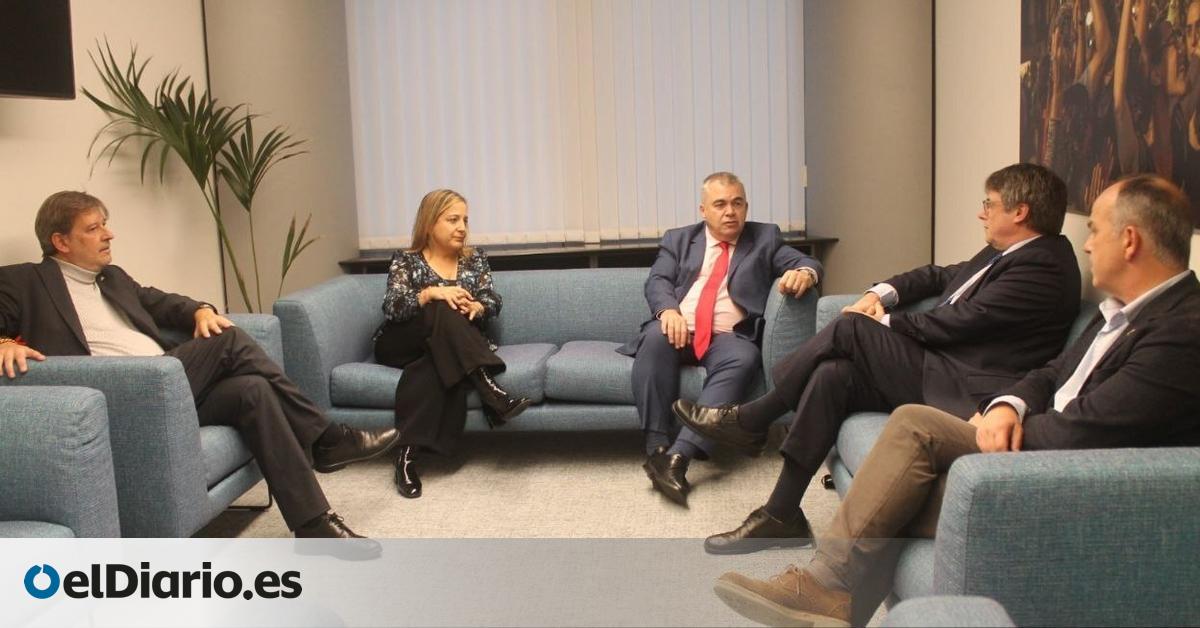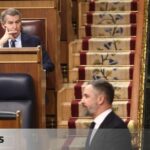
A delegation from the Socialist Party headed by its secretary of organisation, Santos Cerdán, landed in Switzerland on Friday with the same mission as it did about a year ago: to negotiate with Carles Puigdemont the support for the Government of its seven deputies in Congress. Then, those conversations crystallized in the amnesty law and the investiture of Pedro Sánchez. But since the summer, this parliamentary collaboration of the Catalan independentists has been cut short. According to sources familiar with the organisation of this meeting consulted by elDiario.es, the plan was for a first meeting to take place this Friday afternoon and for contacts to be resumed on Saturday.
Since parliamentary proceedings have resumed, political events such as the investiture of Salvador Illa, or judicial events, such as the Supreme Court’s decision to exclude the former president from the amnesty, have pushed Puigdemont’s party to oppose the Executive and to unite their votes with those of the PP and Vox to overturn transcendental measures of the Government. And the meeting for which the socialist delegation travelled to Switzerland this Friday, both parties agree, may be decisive in gauging to what extent this situation is manageable.
In the hours leading up to the meeting between Santos Cerdán and Carles Puigdemont, expectations in Ferraz and Moncloa were not too optimistic. The political atmosphere in Congress during the week did not invite anything else either. After announcing its abstention from a proposal on housing, Junts changed its vote at the last minute and joined its seven deputies with those of the PP and Vox to defeat the parliamentary process of that proposal and inflict yet another punishment on the Government. A move that has been followed by explicit threats from Carles Puigdemont himself on his social networks about his willingness to vote against Pedro Sánchez’s legislative measures again if there are no changes in the political relationship between the two parties.
The new meeting in Switzerland is therefore taking place in the aftermath of the Government’s last parliamentary setback, but also on the eve of another key vote: that on the stability path, which will take place next Thursday. Already rejected by Junts, PP and Vox at the end of July, the Council of Ministers approved it again on September 10 for a second attempt. According to data from the Ministry of Finance, whether or not these new stability objectives are approved depends on a fiscal margin for autonomous communities and municipalities of up to 11.5 billion euros in the next two years.
Support for the Budgets
Beyond these figures, which are crucial for the accounting of the regional and local governments, the push for a new path contains an important political message. Pushing it forward would provide Pedro Sánchez’s Executive with a breath of fresh air regarding the negotiation of the 2025 General State Budget that Moncloa wants to promote before the end of the year and for which, as for almost everything, the support of the seven Junts deputies is essential.
In the PSOE, however, they prefer to take it step by step. Aware of the difficulties involved in depending on Carles Puigdemont to have or not a majority in the Congress of Deputies, the socialists assumed this week that, above all, the meeting with the former president was going to become a crossfire of reproaches that the leader of Junts has already begun to air in public in recent days.
“Losing respect for those who have the votes you need and not working hard to win them in each vote is the most direct path to failure. I repeat: these were the rules of the game that we set out from day one, so you cannot act surprised. Is a decree, a law, an appointment not negotiated? Then you cannot take our vote for granted. Not ours,” Puigdemont posted on his social networks after his group voted against the housing bill.
Junts insists that the warning they issued to Pedro Sánchez at the beginning of the legislature, that of “sweating the shirt” in each vote, remains valid for them. “We negotiate piece by piece. If you comply, you comply. And if not, there are no votes. Let them understand, they do not have a majority. We give nothing in exchange for nothing. And in exchange for everything, a lot,” warns the Catalan pro-independence parliamentary group.
What Junts is trying to distance itself from is the Government’s thesis that, in reality, what has made Puigdemont change his relationship with the PSOE is not any failure by the Executive but a double frustration: that the Supreme Court prevents him for now from taking advantage of an amnesty law that he himself and his team helped to draft and, above all, that he is excluded from the governability of Catalonia due to the pact between the PSC and ERC.
“Everything has changed since Salvador Illa was sworn in,” say Pedro Sánchez’s team, who are also waiting to see the results of the meeting between Cerdán and Puigdemont on Friday. “We hope they will reconsider. They have to digest that Illa is president and realise that it is not sustainable to always side with the PP and Vox.”
Reproaches to the former president
Although the mission of the socialist delegation to Switzerland is to calm things down and try to redirect a political situation that in practice leads the legislature to a deadlock, there is no shortage of reproaches from Pedro Sánchez’s party to the former Catalan president. The PSOE claims that they have fulfilled “point by point” everything they promised Puigdemont and have assumed “a political cost that almost no one would have dared to face.”
The message they are sending to their interlocutors in Switzerland is that the deepening of self-government in Catalonia and the validity of the amnesty law are only guaranteed with a progressive government. And that any hypothesis of opening the door to the right would therefore be harmful to all Catalans and to Puigdemont himself.
In an attempt to protect the stability of the Executive from Puigdemont’s ups and downs and from a possible failure of the attempt to rebuild bridges with Junts, Pedro Sánchez maintains in public and in private that the legislature is going to be long and that, even without a Budget, the Government is guaranteed “for a while.” This is what he said to his parliamentarians this week at the meeting of the Socialist Group and this is what he also said to the lehendakari, Imanol Pradales, at their meeting this Friday at Moncloa. “The impression is that President Sánchez wants to continue with a long legislature,” said Pradales at a press conference after meeting with the president.
The leader of the Basque Executive also assured that Sánchez can count on the collaboration of his party to “play in favour of stability in the state” because, in his opinion, “it is good to be able to continue advancing in issues that affect the improvement of self-government for the Basques”. And that is why he even hinted at his willingness to lend a hand in the dialogue with Junts. “The relationship between the Spanish Government and Junts will have its own channels but we have always tried to favour the maintenance of political stability in the state,” he assured.
The president’s team is considering it a real option that the bridges with Puigdemont will be impossible to rebuild for the moment. And yet they reiterate that Pedro Sánchez’s horizon is none other than to continue. Until Junts agrees to collaborate, or until it endures a legislature in blockade mode.
Source: www.eldiario.es

